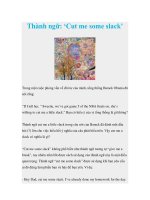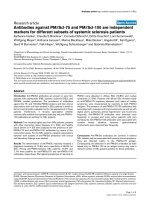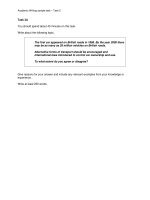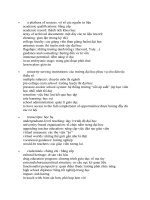Writing task 2 8.5+ 8999 some jobs are more suitable for different genders
Bạn đang xem bản rút gọn của tài liệu. Xem và tải ngay bản đầy đủ của tài liệu tại đây (196.68 KB, 8 trang )
Overall band score
8.5
8+9+9+9
See below C&C LR GRA
Model answer
WRITING TASK 2
You should spend about 40 minutes on this task.
Write about the following topic:
Some people think that men and women have different qualities. Therefore,
some certain jobs are suitable for men and some jobs are suitable for women.
To what extent do you agree or disagree?
Give reasons for your answer and include any relevant examples from your own
knowledge or experience.
Write at least 250 words.
Original answer It is often argued that men and women possess distinct qualities that make them
suited for specific occupations. In this essay, however, I will challenge this
thinking.
Proponents of the idea of job suitability based on gender might argue that
biological differences between men and women lead to distinct strengths and
weaknesses. Men, they say, have greater physical strength and are therefore
more suited for physically demanding jobs, such as construction or firefighting.
Women, in contrast, are perceived as more nurturing and empathetic, which
supposedly makes them better candidates for roles in caregiving, teaching, or
nursing. However, this view is a sweeping generalization, as clearly seen in the
fact that not all females are physically inferior to males, and that there are
numerous men that exhibit exceptional empathetic and caregiving skills.
Moreover, I would emphasize that perpetuating the idea that certain jobs are
suitable for men and others for women risks reinforcing toxic stereotypes and
limiting the potential of individuals to pursue their passions and excel in their
chosen fields. In reality, countless examples demonstrate that men and women
can be equally successful in any profession, regardless of traditional gender
norms. One prime example of this is Ginni Rometty, who was the CEO of IBM, a
tech giant. Under her leadership, the company made significant strides, and she
proved that women are perfectly capable of excelling in tech leadership roles that
have traditionally been dominated by males. By the same token, prominent male
makeup artists like Hung Vango have shown us how wrong it is to assume that
only women can thrive in the realm of beauty.
In conclusion, while there are justifications that certain jobs are inherently
suitable for men or women, I would contend that these reasons are shallow, given
the wide range of individual abilities that can transcend gender stereotypes. To
support a more inclusive and diverse workforce, it is essential to challenge
traditional gender roles and incentivize individuals to pursue careers that align
with their interests and abilities, rather than making assumptions based on
gender.
Overall band score
8.5
8+9+9+9
TR – Task Response nb – GRA and LR errors have not been corrected
Band score 8
The wording of the question is strange and rather extreme. As the question omits
the word more, the implication is that some jobs are only suitable for one gender,
and your position is to disagree with this proposition, which makes sense.
However, at no point did you specifically use the word only (or uniquely) when
you made the arguments, even though you used it in the refutation in main body
paragraph 2.
The fact that most teachers and nurses are women supports the idea that there
are jobs that are better suited to one gender. It’s not reinforcing a toxic
stereotype; it’s a reflection of reality and the choices different genders make. In
most modern societies, men and women are free to go for any career they like,
and gender imbalances reflect the choices people make and not toxic stereotypes
– which is just a western cliché.
If you’d used words like only/uniquely, it would be an excellent answer and good
for a 9.
You have a clear position throughout and all parts of the question are addressed.
Your position is coherent and well-argued.
The ideas are relevant, extended and there are no contradictions.
Advice On Brainstorming For Task 2
As you’re planning and writing your answer, remember to constantly
ask yourself if you’re answering the question. Check back to the
question a few times as you think of ideas to make sure they're
directly relevant.
Make sure your introduction directly addresses the
question.
Make sure your ideas address all parts of the question. If
the question asks for solutions, in the plural, you must
suggest at least 2.
Make sure your main ideas, as stated in the first sentence
of the main body paragraphs, are directly relevant to the
question.
Make sure your supporting ideas, which follow the main
ideas in the main body paragraphs, directly support the
main idea.
Be especially careful if you’ve answered similar question
before, as there will always be important differences.
Make sure your conclusion directly answers the question,
that it is consistent with the ideas in the main bodies, and
that it does not contradict the introduction.
It is often argued that men and women possess distinct qualities that make
them suited for specific occupations. In this essay, however, I will challenge this
thinking. [a]
Proponents of the idea of job suitability based on gender might argue that
biological differences between men and women lead to distinct strengths and
weaknesses[b]. Men, they say, have greater physical strength and are
therefore more suited for physically demanding jobs, such as construction or
firefighting. Women, in contrast, are perceived as more nurturing and
empathetic, which supposedly makes them better candidates for roles in
caregiving, teaching, or nursing[c]. However, this view is a sweeping
generalization[d], as clearly seen in the fact that not all females are physically
inferior to males, [e]and that there are numerous men that exhibit exceptional
empathetic and caregiving skills. [f]
Moreover, I would emphasize that perpetuating the idea that certain jobs
are suitable for men and others for women risks reinforcing toxic stereotypes and
limiting the potential of individuals to pursue their passions and excel in their
chosen fields[g]. In reality, countless examples demonstrate that men and women
can be equally successful in any profession, regardless of traditional gender
norms. One prime example of this is Ginni Rometty, who was the CEO of IBM, a
tech giant. Under her leadership, the company made significant strides, and she
proved that women are perfectly capable of excelling in tech leadership roles that
have traditionally been dominated by males. By the same token, prominent male
makeup artists like Hung Vango have shown us how wrong it is to assume
that only [h]women can thrive in the realm of beauty.[i][j][k]
In conclusion, while there are justifications that certain jobs are
inherently suitable [l]for men or women, I would contend that these reasons are
shallow[m], given the wide range of individual abilities that can transcend gender
stereotypes. To support a more inclusive and diverse workforce, it is essential to
challenge traditional gender roles and incentivize individuals to pursue careers
that align with their interests and abilities, rather than making assumptions based
on gender.[n]
C&C - Cohesion and Coherence nb GRA and LR errors have not been corrected
Band score 9
Excellent cohesion and coherence throughout, with no errors.
The sentences have a natural flow characteristic of high band score answers.
Paragraphing for Task 2
I recommend you write 4 paragraphs as follows:
Write an introduction, that explains what the question is.
After reading the introduction, the reader should have a
good idea what the essay is about, and what your position
(opinion) is. It should be possible to write an introduction in
under 50 words. It is not necessary to write a long
background statement.
Write 2 main body paragraphs. This should allow you to
expand on the ideas sufficiently to persuade the examiner
that you’ve fully supported the main ideas. If you write 3
main bodies, it is more difficult to expand and support them
sufficiently to get a high score.
If it’s a two-part question, answer the questions in the order
they’re given and write one paragraph per question.
The main body paragraphs should be 100-120 words, and
each paragraph should have a clear topic sentence and 2 or
more supporting ideas which support the topic sentence with
reasons, evidence, and examples. Do not waste time with
lots of background information.
The topic sentences should directly address the question.
The conclusion should be consistent with the introduction
and the main ideas, and it should not introduce new ideas. It
should directly answer the question. Do not leave the
examiner in any doubt about whether you’ve answered the
question.
If you write a third paragraph in a discuss both sides question
to clarify your position, make sure that give a good reason to
reject one of the sides. If you just restated the original ideas
about one side, the examiner may decide you have covered
one side more than the other.
It is also ok to write a third body paragraph in a to what
extent question if you have main ideas which both agree and
disagree with the proposition. Avoid short paragraphs, with
under 70 words, as it may be difficult to show a clear central
topic in a short paragraph.
It is often argued that men and women possess distinct qualities that make them
suited for specific occupations. In this essay, however, I will challenge this
thinking.
Proponents of the idea of job suitability based on gender might argue that
biological differences between men and women lead to distinct strengths and
weaknesses[o]. Men, they say, have greater physical strength and are therefore
more suited for physically demanding jobs, such as construction or firefighting.
Women, in contrast, are perceived as more nurturing and empathetic, which
supposedly makes them better candidates for roles in caregiving, teaching, or
nursing. However, this view is a sweeping generalization, as clearly seen in the
fact that not all females are physically inferior to males, and that there are
numerous men that exhibit exceptional empathetic and caregiving skills. [p]
Moreover, I would emphasize that perpetuating the idea that certain jobs are
suitable for men and others for women risks reinforcing toxic stereotypes and
limiting the potential of individuals to pursue their passions and excel in their
chosen fields[q]. In reality, countless examples demonstrate that men and women
can be equally successful in any profession, regardless of traditional gender
norms. One prime example of this is Ginni Rometty, who was the CEO of IBM, a
tech giant. Under her leadership, the company made significant strides, and she
proved that women are perfectly capable of excelling in tech leadership roles that
have traditionally been dominated by males. By the same token, prominent male
makeup artists like Hung Vango have shown us how wrong it is to assume that
only women can thrive in the realm of beauty.[r]
In conclusion, while there are justifications that certain
jobs are inherently suitable for men or women, I would contend that these
reasons are shallow, given the wide range of individual abilities that can
transcend gender stereotypes. To support a more inclusive and diverse
workforce, it is essential to challenge traditional gender roles and incentivize
individuals to pursue careers that align with their interests and abilities, rather
than making assumptions based on gender.
LR- - Lexical resource nb Some GRA errors have not been corrected
Band score 9
Vocabulary is used accurately with sufficient flexibility to show precise meaning,
with a wide variety of vocabulary, used accurately and with a high level of control.
It is often argued that men and women possess distinct qualities that make them
suited for specific occupations. In this essay, however, I will challenge this
thinking.
Proponents of the idea of job suitability based on gender might argue that
biological differences between men and women lead to distinct strengths and
weaknesses. Men, they say, have greater physical strength and are therefore
more suited for physically demanding jobs, such as construction or firefighting.
Women, in contrast, are perceived as more nurturing and empathetic, which
supposedly makes them better candidates for roles in caregiving, teaching, or
nursing. However, this view is a sweeping generalization, as clearly seen in the
fact that not all females are physically inferior to males, and that there are
numerous men that exhibit exceptional empathetic and caregiving skills.
Moreover, I would emphasize that perpetuating the idea that certain jobs are
suitable for men and others for women risks reinforcing toxic stereotypes and
limiting the potential of individuals to pursue their passions and excel in their
chosen fields. In reality, countless examples demonstrate that men and women
can be equally successful in any profession, regardless of traditional gender
norms. One prime example of this is Ginni Rometty, who was the CEO of IBM, a
tech giant[s]. Under her leadership, the company made significant strides, and she
proved that women are perfectly capable of excelling in tech leadership roles that
have traditionally been dominated by males. By the same token, prominent male
makeup artists like Hung Vango have shown us how wrong it is to assume that
only women can thrive in the realm of beauty.
In conclusion, while there are justifications that certain jobs are inherently
suitable for men or women, I would contend that these reasons are shallow, given
the wide range of individual abilities that can transcend gender stereotypes. To
support a more inclusive and diverse workforce, it is essential to challenge
traditional gender roles and incentivize individuals to pursue careers that align
with their interests and abilities, rather than making assumptions based on
gender.
GRA – Grammatical range and accuracy nb Some LR errors have
not been corrected
Band score 9
Grammar is used accurately with a wide variety of structures, which should be
good for a band score 9.
Punctuation is used correctly throughout.
Appropriate structures are used throughout.
It is often argued that men and women possess distinct qualities that make them
suited for specific occupations. In this essay, however, I will challenge this
thinking.
Proponents of the idea of job suitability based on gender might argue that
biological differences between men and women lead to distinct strengths and
weaknesses. Men, they say, have greater physical strength and are therefore
more suited for physically demanding jobs, such as construction or firefighting.
Women, in contrast, are perceived as more nurturing and empathetic, which
supposedly makes them better candidates for roles in caregiving, teaching, or
nursing. However, this view is a sweeping generalization, as clearly seen in the
fact that not all females are physically inferior to males, and that there are
numerous men that exhibit exceptional empathetic and caregiving skills.
Moreover, I would emphasize that perpetuating the idea that certain jobs are
suitable for men and others for women risks reinforcing toxic stereotypes and
limiting the potential of individuals to pursue their passions and excel in their
chosen fields. In reality, countless examples demonstrate that men and women
can be equally successful in any profession, regardless of traditional gender
norms. One prime example of this is Ginni Rometty, who was the CEO of IBM, a
tech giant. Under her leadership, the company made significant strides, and she
proved that women are perfectly capable of excelling in tech leadership roles that
have traditionally been dominated by males. By the same token, prominent male
makeup artists like Hung Vango have shown us how wrong it is to assume that
only women can thrive in the realm of beauty.
In conclusion, while there are justifications that certain jobs are inherently
suitable for men or women, I would contend that these reasons are shallow, given
the wide range of individual abilities that can transcend gender stereotypes. To
support a more inclusive and diverse workforce, it is essential to challenge
traditional gender roles and incentivize individuals to pursue careers that align
with their interests and abilities, rather than making assumptions based on
gender.









